

Rubys/venus. Planet Venus source code. ♀ Planet Venus Planet Venus is an awesome ‘river of news’ feed reader.
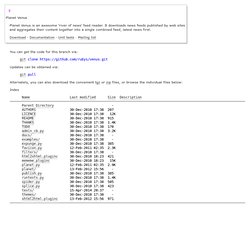
It downloads news feeds published by web sites and aggregates their content together into a single combined feed, latest news first. Download · Documentation · Unit tests · Mailing list You can get the code for this branch via: git clone Updates can be obtained via: git pull Alternately, you can also download the convenient tgz or zip files, or browse the individual files below: Index Name Last modified Size Description. Venus Installation. Planet Venus is an awesome ‘river of news’ feed reader.
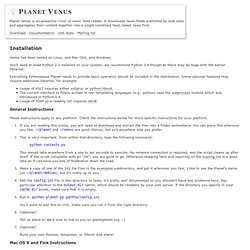
It downloads news feeds published by web sites and aggregates their content together into a single combined feed, latest news first. Download · Documentation · Unit tests · Mailing list Venus has been tested on Linux, and Mac OSX, and Windows. You'll need at least Python 2.2 installed on your system, we recommend Python 2.4 though as there may be bugs with the earlier libraries. Everything Pythonesque Planet needs to provide basic operation should be included in the distribution. Usage of XSLT requires either xsltproc or python-libxslt.The current interface to filters written in non-templating languages (e.g., python) uses the subprocess module which was introduced in Python 2.4.Usage of FOAF as a reading list requires librdf.
General Instructions These instructions apply to any platform. If you are reading this online, you will need to download and extract the files into a folder somewhere. Mac OS X and Fink Instructions. Venus Templates. Planet Venus is an awesome ‘river of news’ feed reader.
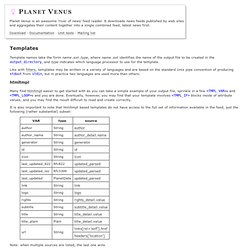
It downloads news feeds published by web sites and aggregates their content together into a single combined feed, latest news first. Download · Documentation · Unit tests · Mailing list Template names take the form name.ext.type, where name.ext identifies the name of the output file to be created in the output_directory, and type indicates which language processor to use for the template. Like with filters, templates may be written in a variety of languages and are based on the standard Unix pipe convention of producing stdout from stdin, but in practice two languages are used more than others: htmltmpl Many find htmltmpl easier to get started with as you can take a simple example of your output file, sprinkle in a few <TMPL_VAR>s and <TMPL_LOOP>s and you are done. Note: when multiple sources are listed, the last one wins Note: variables above which start with new_ are only set if their values differ from the previous Item.
Venus Configuration. Planet Venus is an awesome ‘river of news’ feed reader.
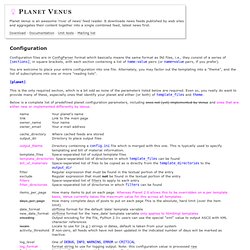
It downloads news feeds published by web sites and aggregates their content together into a single combined feed, latest news first. Download · Documentation · Unit tests · Mailing list Configuration files are in ConfigParser format which basically means the same format as INI files, i.e., they consist of a series of [sections], in square brackets, with each section containing a list of name:value pairs (or name=value pairs, if you prefer). You are welcome to place your entire configuration into one file.
Alternately, you may factor out the templating into a "theme", and the list of subscriptions into one or more "reading lists". [planet] This is the only required section, which is a bit odd as none of the parameters listed below are required. Below is a complete list of predefined planet configuration parameters, including ones not (yet) implemented by Venus and ones that are either new or implemented differently by Venus. Venus. Venus Filters. Planet Venus is an awesome ‘river of news’ feed reader.
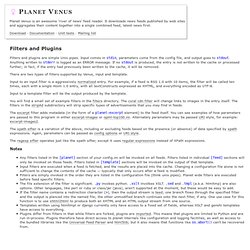
It downloads news feeds published by web sites and aggregates their content together into a single combined feed, latest news first. Download · Documentation · Unit tests · Mailing list Filters and plugins are simple Unix pipes. Input comes in stdin, parameters come from the config file, and output goes to stdout. Anything written to stderr is logged as an ERROR message. There are two types of filters supported by Venus, input and template. Input to an input filter is a aggressively normalized entry. Input to a template filter will be the output produced by the template. You will find a small set of example filters in the filters directory. The excerpt filter adds metadata (in the form of a planet:excerpt element) to the feed itself. The xpath sifter is a variation of the above, including or excluding feeds based on the presence (or absence) of data specified by xpath expressions.
Notes. Venus Documentation. Planet Venus source code. Venus Installation. Nope hasn't won - last update 3yrs+